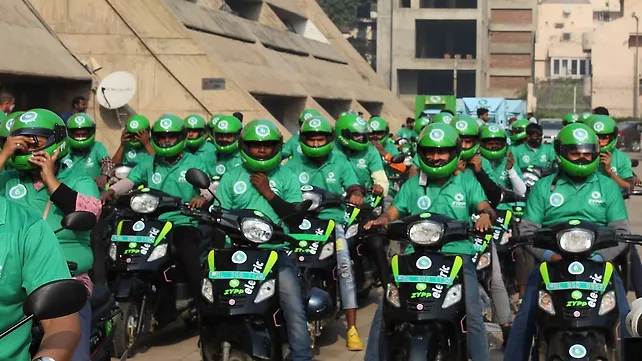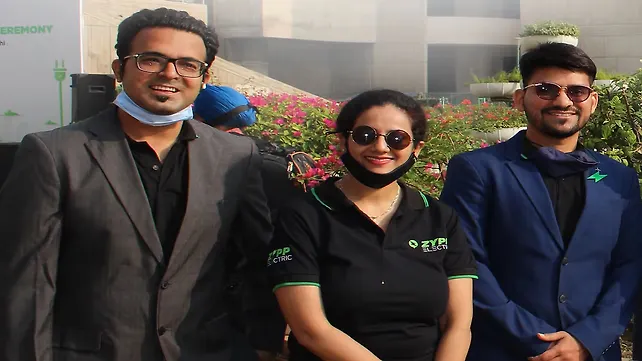
E-commerce, ultra-fast and last-mile deliveries are giving birth to newer business models and challenges. End-consumers placing orders for groceries as low as INR 150 have probably forced players like Big Basket, Zepto, Amazon and others to explore mobility mediums powered by cheaper alternatives to petrol and diesel.
Gurugram-headquartered start-up Zypp Electric, in these circumstances, is helping e-commerce and logistics players bring down the cost of deliveries by deploying e2Ws for the last-mile deliveries.
In a conversation with Mobility Outlook, Akash Gupta, Co-founder & CEO, Zypp Electric, noted that his start-up has around 5,000 EVs deployed in Delhi NCR for making deliveries. 'We are adding 1,000 EVs per month on an average to our fleet. The numbers are 5,000 right now and our projections show that we will have close to 20,000 EVs deployed before the end of FY 2023,' Gupta said.
Zypp Electric claims to be EBITDA positive. It had generated revenues of INR 25 crore in FY22. The start-up has projected a revenue of INR 150 crore during the ongoing fiscal year. It has so far raised $9 million in equity and $3 million in vehicle leasing. Gupta added, 'We exited the cash-burning stage some four months ago. The aim right now is to stay EBITDA positive.'
Hero Electric - The largest OEM Partner
The value Zypp Electric creates in the logistics and delivery segment can be gauged from the OEM partners it is working with. For instance, Hero Electric does not offer swappable battery tech electric two-wheelers in the end-consumer market. However, it is developing and making such electric scooters for Zypp Electric. 'Hero Electric is one of our largest partners. We are also in talks with Hop Electric, Jitendra EV, Bounce and a couple of more OEMs for sourcing EVs fit for deliveries,' stated Gupta.
Zypp Electric, like most other delivery and logistics players, follows an asset-light model, but it does not mandate individuals to invest in EVs to become a rider with it. Instead, it allows individuals and NBFCs to invest in EVs and rent it to Zypp.
Gupta mentioned that Zypp promises returns for up to 36 months on such investments. For example, on an EV that costs INR 75,000, Zypp electric promises to pay back INR 2,300 every month, and at the end of 36 months, it also gives the EV investors a chance to sell EVs at a price of INR 7,500 each.
'We get NBFCs, banks, private investors to invest in EVs. They invest in us because we have a positive balance sheet and a good track record. We help investors make INR 90,000 at the end of 36 months. So they had originally invested INR 75,000 but after three years they have made INR 15,000 extra,” explained Gupta.
Today about 4,000 riders are using Zypp Electric EVs and platforms to earn a livelihood, stated Gupta. The company rents EVs to riders at starting prices of INR 100 per day. This rent is for a fully charged electric bike with a range of around 120 km. 'A delivery rider, on an average, does not ride for more than 120 kms in a day, and INR 100 per day gets him the bike and access to Zypp's platform,' explained Gupta.

He claims that a delivery rider normally earns INR 12,000 to INR 15,000 per month. The start-up has also seen riders covering a lot more than 120 km in a single day. INR 100 essentially gets an individual an electric bike for a day, access to delivery orders, and training on how to operate EVs and Zypp platform for the first-timers.
'The bikes with the Zypp logo in green are acting as the biggest discovery engine for us right now. Riders who are already working with us are bringing in their friends and family to work with us. That is how we have been able to add around 1,000 EVs to our fleet every month,' said Gupta.
Price Per Delivery Model
While the start-up has created a win-win for the investors and the gig workers partnering with it, it has also made sure to stay EBITDA positive by following a 'price per delivery' model. As the name suggests, the model follows a simple approach of charging a specific price for a specific delivery. 'The toughest part was optimising our platform for deliveries starting early in the morning and ending at late nights. Our riders today deliver milk in the mornings and also deliver food during Zomato peak at night. Our electric bikes are now getting used for as long as 16 hours a day,' explained Gupta.
The company's platform allows riders to pick slots and the time durations they want to work in one stretch. Gig workers can choose from working for one hour up to six or eight hours using the platform. The majority of earnings (80% to 85%) per delivery are given to the rider, whereas the rest (10% to 15%) is the share of Zypp Electric.
The start-up is not aiming to join the long-haul delivery vertical and add e3Ws or four-wheelers to its fleet. Instead, it ensures the safety of electric vehicles and investments made by equipping a proprietary IoT device onto the EVs joining its feet.
“We are focused on fast deliveries and last mile deliveries. e2Ws suit this vertical the most, and we want to remain focused on the same. We might add e3Ws to our fleet, but there are no such plans for at least two more years,” concluded Gupta.
Also Read
“Mahindra Logistics Will Electrify 40% Of Its Fleet By 2026”